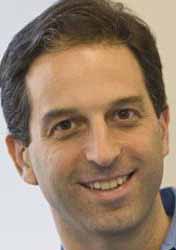Ron Weiss,
Director, MIT Synthetic Biology Center; Professor,
Massachusetts Institute of Technology (MIT)
Ron Weiss is Professor in the Department of Biological Engineering and in the Department of Electrical Engineering and Computer Science at the Massachusetts Institute of Technology, and is the Director of the Synthetic Biology Center at MIT. He is also the Principal Investigator of the MIT Center for Integrative Synthetic Biology established and funded in September of 2013 as part of the NIH-NIGMS national centers for systems biology (cisb.mit.edu). He received his PhD from MIT in 2001 and held a faculty appointment at Princeton University between 2001 and 2009. His research focuses primarily on synthetic biology, where he programs cell behavior by constructing and modeling biochemical and cellular computing systems. A major thrust of his work is the synthesis of gene networks that are engineered to perform in vivo analog and digital logic computation. He is also interested in programming cell aggregates to perform coordinated tasks using cell-cell communication with chemical diffusion mechanisms such as quorum sensing. He has constructed and tested several novel in vivo biochemical logic circuits and intercellular communication systems. Weiss is engaged in both hands-on experimental work and in implementing software infrastructures for simulation and design work. For his work in synthetic biology, Weiss has received MIT's Technology Review Magazine's TR100 Award ("top 100 young innovators", 2003), was selected as a speaker for the National Academy of Engineering's Frontiers of Engineering Symposium (2003), and received the E. Lawrence Keyes, Jr. / Emerson Electric Company Faculty Advancement Award at Princeton University (2003). In addition, his research in Synthetic Biology was named by MIT's Technology Review Magazine as one of "10 emerging technologies that will change your world" (2004). He was chosen as a finalist for the World Technology Network’s Biotechnology Award (2004), and was selected as a speaker for the National Academy of Sciences Frontiers of Science Symposium (2005). Over the last few years, Weiss has had several major publications in journals such as Nature, Nature Biotechnology, Science and PNAS.
http://groups.csail.mit.edu/synbio/
|

|
|

 Add to Calendar ▼2017-03-16 12:30:002017-03-16 13:30:00Europe/LondonSynthetic Biology: From Parts to Modules to Therapeutic SystemsSELECTBIOenquiries@selectbiosciences.com
Add to Calendar ▼2017-03-16 12:30:002017-03-16 13:30:00Europe/LondonSynthetic Biology: From Parts to Modules to Therapeutic SystemsSELECTBIOenquiries@selectbiosciences.com Add to Calendar ▼2017-03-16 00:00:002017-03-17 00:00:00Europe/LondonBioMEMS, Microfluidics and Biofabrication: Technologies and ApplicationsSELECTBIOenquiries@selectbiosciences.com
Add to Calendar ▼2017-03-16 00:00:002017-03-17 00:00:00Europe/LondonBioMEMS, Microfluidics and Biofabrication: Technologies and ApplicationsSELECTBIOenquiries@selectbiosciences.com